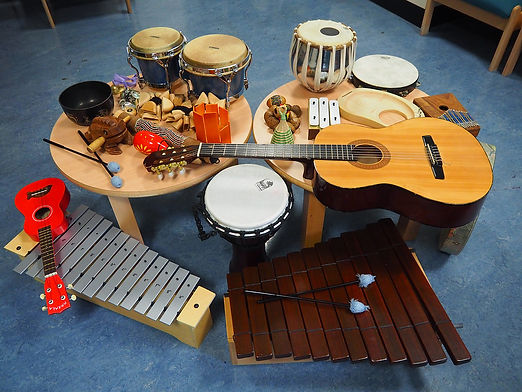Music Therapy
As a HCPC registered music therapist, I provide music therapy sessions and workshops across Wiltshire and the South West of England.
I take a person-centred approach to work with clients of all ages, abilities and backgrounds. Using empathy, sensitivity and communicative qualities, I aim to meet each client where they are, to connect and build an effective relationship so that we can work together towards mutually agreed therapeutic aims and goals.
With experience in a variety of clinical contexts and settings, I have developed a dynamic and positive attitude towards my work that enables me to adapt, professionally, personally and musically, to the needs of my clients.

Since qualifying as a music therapist, I have continued to develop my therapeutic music, professional and personal skills, working with people who are living with Autism, ADHD, brain injury, life limiting conditions, emotional, social, behavioural and mental health difficulties and children from fostered and adopted families. My clinical experience is underpinned by a strong theoretical understanding of music therapy and psychology concepts, including psychodynamic theory, developmental psychology, attachment, trauma, attunement, behavioural psychology, music therapeutic modalities and research methods. I take an integrative approach to music therapy, strongly believing that my ability to meet each individual’s needs is best served by an open and flexible mind, capable of drawing on a variety of techniques, theories and frameworks.
I trained at the University of the West of England and hold a Master’s degree in music therapy. I am registered with the Health and Care Professionals Council (HCPC) and adhere to their professional standards. I also hold an enhanced DBS certificate for work with adults and children as well as professional liability insurance for work as a music therapist.
About me and my practice

What is music therapy?
Music therapy is an established psychological intervention based in research. In a similar way to psychotherapy, counselling and other creative therapies, music therapy aims to provide clients with a safe space where they can express themselves, feel seen, heard, accepted and valued in a supportive and non-judgemental environment. Where music therapy differs from other forms of therapy, is that the primary mode of communication and expression tends to be music. Through the use of music and sound, music therapists develop therapeutic relationships with clients in order to help facilitate positive change in their emotional, physical, mental, social and spiritual well-being.
Who can benefit from music therapy?
The short answer is pretty much anyone! Music therapy has been shown to be helpful for an extremely diverse range of people from all ages and backgrounds. Music therapists often work with children, adults and young people experiencing a variety of challenges including:
-
Mental health difficulties and conditions (depression, anxiety, psychosis)
-
Learning, developmental and physical disabilities
-
Trauma
-
Social, emotional and behavioural difficulties
-
Neuro disability
-
Autistic Spectrum Conditions
-
Attachment and relational difficulties (inc. looked after and adopted children)
-
Dementia
-
Communication difficulties
-
Addiction
-
Palliative care
How can music therapy help?
Music therapy can be helpful in a variety of ways. It is often (but not exclusively) beneficial for people who find it difficult or are unable to express themselves in words. For some clients, talking can play an important role alongside the music and for others, the music can be enough on its own. Whether working with verbal or non-verbal clients, in my experience the physical nature of music making can often provide the opportunity to access and express feelings in a more direct and embodied way.
Music therapy can help adults, children and young people to:
-
Explore and express thoughts and feelings
-
Manage and reduce anxiety
-
Improve mental health and well-being
-
Process trauma
-
Increase awareness and understanding of themselves and others
-
Boost self-esteem and build confidence
-
Develop social interaction and communication skills
-
Develop coordination and motor skills
-
Strengthen family and peer relationships
-
Aid relaxation
-
Encourage creative and spontaneous play
-
Develop concentration and listening skills
My Fees
Please get in touch for information about fees.

